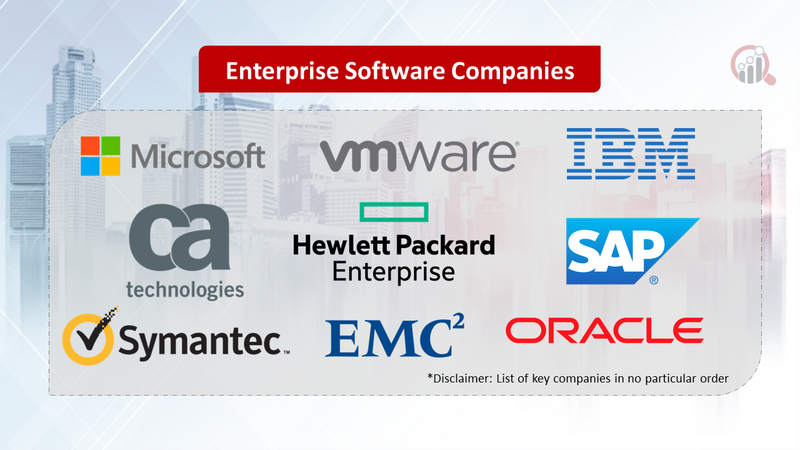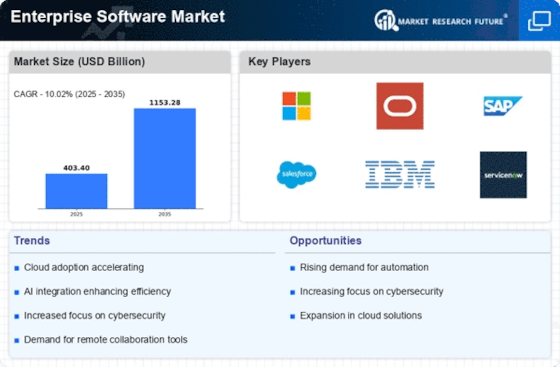Top Industry Leaders in the Enterprise Software Market

Competitive Landscape of the Enterprise Software Market:
The landscape of the enterprise software market is a captivating tapestry woven with established giants, nimble startups, and ever-evolving technologies. In this dynamic arena, understanding the competitive landscape is crucial for navigating the market share battleground and securing a strong foothold.
Key Players:
- Microsoft Corporation (U.S.)
- VMware Inc. (U.S.)
- CA Technologies Inc. (U.S.)
- IBM Corporation (U.S.)
- HP (U.S.)
- Symantec Corporation (U.S.)
- Oracle Corporation (U.S.)
- EMC Corporation (U.S.)
- Sap Se (Germany)
Strategies Fueling Market Dominance:
- Cloud Migration:The mass exodus to cloud-based solutions is a defining trend. Established players are strategically revamping their offerings while cloud-native companies leverage their inherent agility to gain traction.
- Acquisitions and Partnerships:Market consolidation through acquisitions and strategic partnerships is another key strategy. These alliances help expand product portfolios, acquire new customer segments, and access emerging technologies.
- Verticalization and Industry Focus:Tailoring solutions to specific industries like healthcare, finance, or manufacturing unlocks deep domain expertise and caters to unique needs. This hyper-focus drives customer satisfaction and market penetration.
- Embrace of AI and Automation:Integrating artificial intelligence and automation into workflows is a game-changer. This enhances data analysis, process optimization, and predictive insights, boosting efficiency and competitiveness.
Factors Shaping Market Share Analysis:
- Product Portfolio Breadth and Depth:The diversity and functionalities offered within a software suite directly impact market share. Companies with comprehensive solutions cater to a wider range of needs, attracting larger customer bases.
- Pricing Strategy and Flexibility:Subscription-based models, custom pricing options, and freemium tiers are prevalent. Adapting to diverse customer budgets and offering flexible payment structures attracts new users and fosters retention.
- Deployment Options and Customization:Offering cloud, on-premise, and hybrid deployment options gives customers choice and flexibility. Customizable interfaces and add-ons allow for personalized experiences, increasing user satisfaction.
- Customer Support and Implementation:Comprehensive support services, efficient implementation strategies, and continuous training resources are crucial for successful adoption and user retention.
Emerging Stars Reshaping the Horizon:
- Low-code/No-code Platforms:Tools empowering citizen developers to build applications without extensive coding skills are democratizing software development. This opens up new market segments and empowers businesses to innovate faster.
- Hyperautomation and RPA:Robotic process automation and hyperautomation solutions are automating repetitive tasks, freeing up human resources for strategic initiatives. This enhances efficiency and unlocks opportunities for process optimization.
- Industry-Specific Cloud Solutions:Specialized cloud platforms tailored to specific sectors like agriculture or renewable energy are emerging, offering industry-specific functionalities and data insights.
Investment Trends Guiding the Future:
- Security and Privacy:Concerns over data breaches and cyberattacks are leading to increased investment in robust security solutions and compliance measures. Data privacy regulations are also influencing software development and implementation strategies.
- Integration and Interoperability:Seamless integration between disparate software systems is key to creating unified data ecosystems and optimizing operations. Investment in APIs and open standards ensures smooth data flow and collaboration.
- Sustainability and ESG:Sustainability considerations are influencing enterprise software selection, with companies seeking solutions that track energy consumption, optimize resource utilization, and promote responsible business practices.
Latest Company Updates:
October 20, 2023, Forbes highlights the growing importance of digital workplace transformation in the enterprise software market.
November 17, 2023, ZDNet discusses the cybersecurity risks associated with the increasing adoption of cloud enterprise software.
December 28, 2023, The Wall Street Journal reports on the talent shortage in the enterprise software industry, posing a challenge for continued growth.











